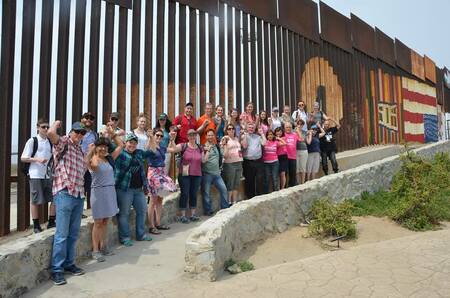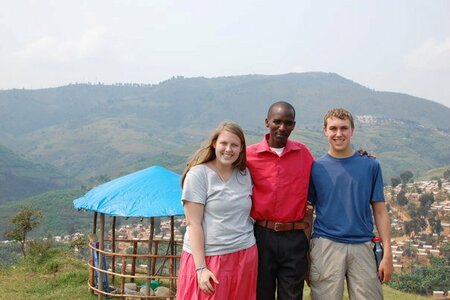
Less than 24-hours into our Peacemaking Trip, a student told me, “We've met ONE immigrant and I'm already changing my mind about this issue!”
Before our trip began, this student was in favor of Trump's campaign promise to build a bigger wall. After standing at the wall hearing stories from immigrants whose families were literally separated by it, she began to question, “We already have a wall. Why do we need another one?”
That's the kind of transformational power mission trips have. They transform people's hearts and minds.
In the age of Trump, that's more important now than ever before.
If our country is going to put “America first” by strengthening our walls and borders, then it's more critical than ever for the church to offer teens (and adults) opportunities to go beyond our nation's walls and borders and meet people who aren't like them.
It's easy to demonize immigrants when you don't know them.
It's much harder to demonize immigrants after you've heard the stories that led to their migration and realized how human they are.

It's simple to say refugees are terrorists if you've never met one.
It's much more difficult to stereotype refugees when you've stood with them at the edge of a refugee camp, quietly wiping tears from your eyes as you gazed at their homeland and realized that while they can see their country, they cannot return there. To do so would result in their death – not because of anything they've done but simply because they're the wrong race or religion.
International mission trips allow us to travel, to expand our own metaphorical and physical boundaries (even when our country is trying to shrink them) while at the same time coming into contact with people of different races and nationalities.
Mission trips challenge us to see how God is at work in the world – not just in the United States – and to recognize that maybe, just maybe, God doesn't want us to put America first; He wants us to put people – from every tribe and nation - first.
Mission trips give us a laboratory in which to explore and live out Scripture. They give us the chance to see how those who live with genuine persecution or in the midst of real poverty might interpret Scripture differently than those of us who have only known a life of privilege. They enable us to recognize that when Jesus said “Love your neighbor”, he wasn't just talking about loving the person who lives next door to us.
Mission trips enable us to recognize the humanity of others. They allow us to see what we have in common and put us into positions where we can learn from one another. They give us the chance to befriend people who look nothing like us and, who under Trump's new policies, may never be allowed into the United States.
In short, mission trips force us into relationships with people, some of whom are very different than us. When those relationships form, we realize something stunning: Just because someone is different from us, doesn't mean we have to fear them.
In the age of Trump, our borders may soon be tightening. If that occurs, our chances to interact with those of different religions and ethnicities within the United States may decrease.
In that scenario, international mission trips become an even more critical opportunity to interact with immigrants, refugees, and anyone else who is “othered” and learn that they, too, are made in the image of God, inherently valuable.